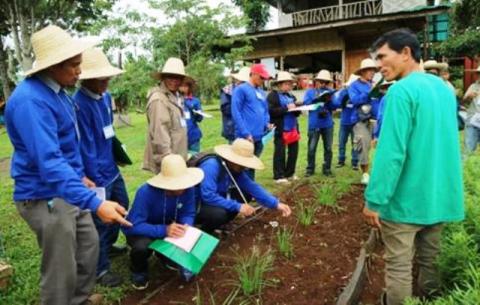A hands-on demo and benchmarking activity of the training-participants in progress at Umanika Farm. The point of benchmarking is to identify internal opportunities for improvement by the rice farmers by trading or swapping of good agricultural practices and deliver satisfying results in their next undertaking.
MALAYBALAY CITY, Bukidnon---With rice as the staple food of the majority of the Filipinos in the country, it is considered as the most important food crop since it can be utilized in any form and is an excellent source of complex carbohydrates followed distantly by bread. Filipinos eat rice in huge quantities. Even if the Philippines is one of the world’s biggest producers of rice, it still has a big need to import. Importing rice from other countries is necessary because there is the need to maintain the supply of available rice for the consumers.
To keep the problem of rice shortage at bay, the country aimed to reduce the amount of rice being imported from other countries by helping improve the production of rice in its own land. The means to do this include the production of cheaper and more accessible fertilizers and support for research for more efficient production of rice.
Recently, a Training of Trainers for New Local Farmer Technicians (LFT) was held in collaboration with the Department of Agriculture-Regional Field Office 10 (DA-RFO X). Twenty-seven (27) participants attended most of which are farmers were selected by the DA-RFO X through the different municipalities in Region X. They are farmers who are now known as Local Farmer Technicians.
The Local Farmer Technician Program aims to develop a core of qualified and trained rice farmers as reinforcement of LGU-based agricultural extension workers in developing and promoting modern rice production and post-production technologies. Rice Focal Person Ms. Jhoylie Mae C. Rosales was at the helm of the training in terms of organizing and facilitating the event.
Meanwhile, the LFTs will teach their fellow rice growers in their respective communities about scientific technologies which they learned from their training at the same time augment the insufficient number of agricultural extension workers at the village level. The shift to a market-oriented farming will enable them to learn proper matching and selection of farm technologies and safe farm supplies to reduce crop damages and packaging of fresh and finished farm products acceptable to the market and safe consumption standards for both local and global markets.
The training participants have undertaken the Climate Smart Farm Business School (CSFBS) course which aims to create new ways of upgrading potential farmers to enrich their awareness, understanding, and learning to adapt not only to changing climate but also to reorient their families' ecological and farm resources into economic units that will enable them to acquire knowledge on business farming.
The 10-day training was conducted on July 31, 2018 to August 9, 2018 at the Northern Mindanao Agricultural Crops and Livestock Research Complex (NMACLRC) in Dalwangan, Malaybalay City, Bukidnon. (with reports from Jhoylie Mae C. Rosales, Development Management Officer-II)

